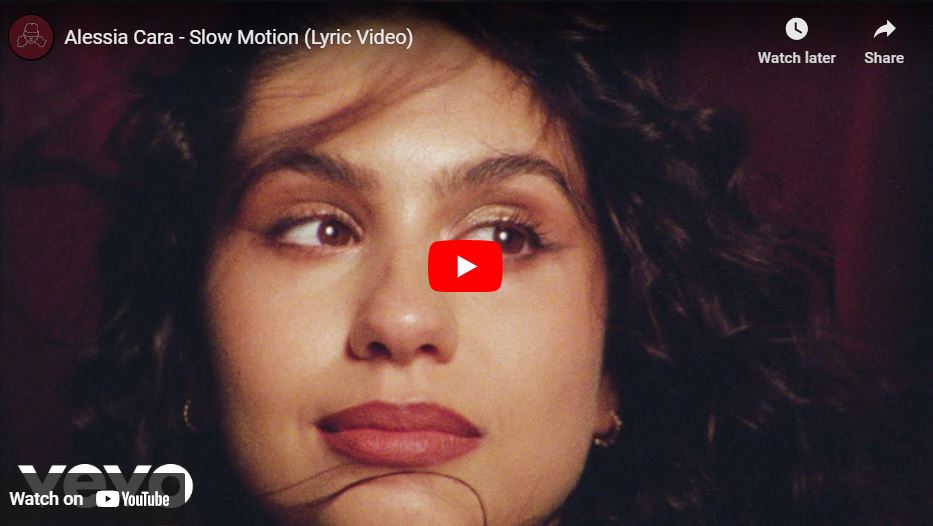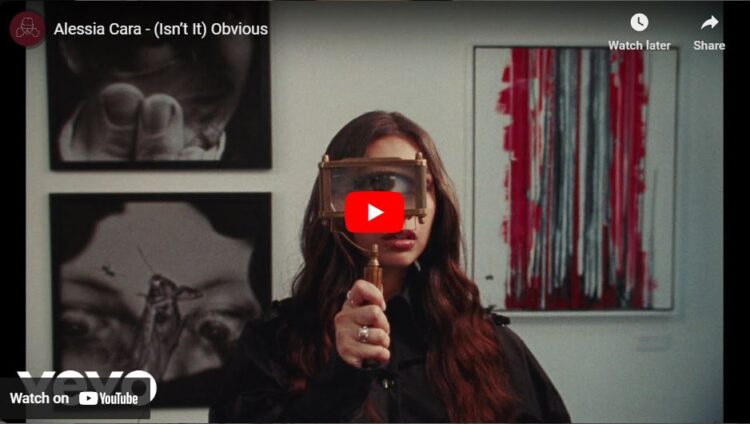“Nowadays, I’m just less scared to say an idea in the room,” says Grammy and multiple JUNO Award winner Alessia Cara, reflecting on a decade of co-writing since releasing her Top 10 debut album, Know-It-All, in 2014 – and three albums later, racking up more than 12.5 billion global streams to date, and dozens of Gold, Platinum, and Multi-Platinum sales certifications.
While the 28-year-old pop/R&B artist does write songs on her own, there are 20-odd co-writers on the 14 songs that comprise her fourth album, Love & Hyperbole, out Valentine’s Day (Feb. 14) 2025. That said, there’s one area that has virtually no collaborators: the lyrics. Those are Cara’s domain, including the singles “(Isn’t It) Obvious” (with guest guitarist John Mayer) and “Slow Motion.”
“Of course, there’s always exceptions, where if I say the word ‘blue,’ and they say, ‘What if you say the word ‘do’?’ Things like that,” Cara laughs. “I’ll never be, like, ‘No, it has to be mine.’ But for the most part, I really want things to just come from me.” Anything after her second album, she says, she did that.
The Brampton, Ontario-raised singer, guitarist, and pianist, who now lives in Toronto, first attracted interest in her early teens. She posted videos of herself playing guitar or keyboards, singing covers of songs by the likes of Jessie J and Adele – but it was her version of The Neighbourhood’s “Sweater Weather” that really took off.
When she signed her recording contract at 18, she was paired up with professional writers, which she remembers as “very collaborative” and made her fall “in love with the idea of songwriting.” It was a welcome opportunity to learn.
“I’ve always wanted to write all my own music because I thought that that’s what everybody did, so it was always a dream of mine,” says Cara. “It’s so special when the listeners know that everything I’m saying is coming from me. It’s the most personal. That way that I can process my own feelings through doing it on my own.”
Collaborators or not, her lyrics spoke to people, especially young women – and maybe some old ones, too. She sang of awkwardness, of self-esteem, of unattainable beauty standards, anxiety, fitting in, growing up, and the kind of complications in love and loving that never go away.
Her first single, “Here,” in 2015, was basically about feeling awkward at parties. It eventually became a Top Five hit in the U.S., and helped fuel the album’s rise into the Top 10 on Billboard’s Hot 100. The third single “Scars To Your Beautiful,” about self-love, also became a Top 10 hit in the U.S., and Australia, Iceland, Slovenia, and Sweden, and Top 15 in Canada. She won the JUNO Award for Breakthrough Artist of the Year in 2016, and Pop Album of the Year in 2017.
“It’s so special when the listeners know that everything I’m saying is coming from me”
In addition to placing her song “How Far I’ll Go” on the soundtrack to the hit Disney animated movie Moana, Cara was featured on Troye Sivan’s “Wild” in 2015; “Stay” with Zedd in 2017; and Logic’s “1-800-273-8255” with Khalid.
In 2018, Cara made Grammy history as the first Canadian to win Best New Artist, and released her long-awaited sophomore album, The Pains of Growing. That LP went on to win three JUNO Awards – for Album, Pop Album, and Songwriter of the Year, the latter for “Growing Pains,” “Out of Love,” and “Rooting For You” (alongside her co-writers).
When it came time to make album number three, it was COVID times. Cara was now in her mid-20s, and having a tough time. In fact, her therapist at the time told her to set aside a half-hour of “worry time” each day to get through, though she’s since grown out of that phase. “I was in the thick of my anxiety” she says of 2020. “I was going through a really rough mental patch.” The resulting album, In The Meantime, was called “incisive and introspective as ever,” by the New York Times, and one in which she “sings about the passage of time… romantic disappointment and feelings of inadequacy.”
The new LP turns out to be much more positive, at least by the end. Love & Hyperbole is a chronology of emotional change. It starts with a person who’s “lonely in L.A.,” as the lyric says, “staring at my ceiling” in the album’s opening song, “Go Outside!” It moves to the giddiness of “missing you before you even leave” in “Slow Motion,” to “jumping in headfirst” in “Fire.” The journey culminates in the closing song, “Clearly,” encapsulating the maturity to see that the “smoke cleared, we healed,” and asking to “forget about the rest and start over.”
But it’s the third song on the album, “Dead Man,” which Cara says, “was that beginning part of the story surrounding love,” even though she wrote it later. “I do think it’s crucial to let go of old things, and understand what you don’t want in order to find out what you do want – in love, or just in life in general.”
Of the 14 songs, only “Nighttime Thing,” has co-writers credited with the lyrics, but the music was written with numerous collaborators, some of them also producers. Jon Levine and Mike Elizondo are the only people listed more than once, Levine on “Run Run,” “Clearly,” and “Get To You,” and Elizondo on “Go Outside!,” “Dead Man,” and “Subside.”
“You get a new perspective when you’re making music with people in the room,” says Cara. “In the past, I’ve been such a shy writer, where I would have a whole song finished before I went in the room, because I was afraid of saying a bad idea out loud.” Now she says she has a rather unique way of coming up with words and melodies. She’ll often “mumble out something.” That’s when the writer/producers in the room really help find those nuggets upon which a song can be built.
“To have another person, whose taste I trust, to tell me, ‘Wait, you just did something there, that was cool,’ or ‘This could be better,’ or ‘That was actually really good, don’t give up on that’ – having that second perspective, and that the fresh set of ears, is actually quite nice,” says Cara.
The other reason she doesn’t work with just one producer, the way a rock band does, isn’t just because it’s become the norm in the pop world — she simply loves people.
“Everybody has such a different perspective, and a way of working, and it’s intriguing to me to just try different things. I felt like I really needed that for this album,” says Cara. “I ended up loving so many different people. It was hard to even just pick one person to work with, because everybody has so many different things to offer. I just like people, and I like creators.”

